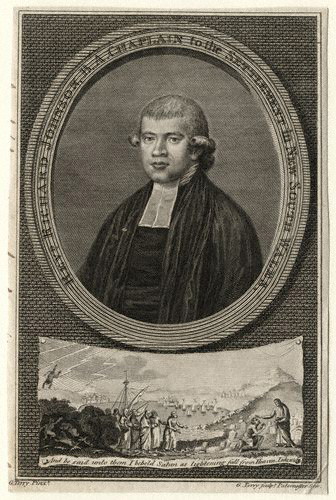
Rev Richard Johnson and his wife Mary arrived in Botany Bay with the First fleet in 1788. They faced precarious challenges. In letters to London Johnson often shared his heartfelt concerns. Two years after arrival the confronting circumstances remained.
On August 21, 1790 Johnson wrote: “Have been very much employed since the arrival of this last fleet. These came in here in a most deplorable situation. Near 300 died upon the passage, & since their arrival I have buried above 100 more. Numbers yet sick, some likely to die, & others never to appearance will be fit for any employment. Never did I see such a scene of Misery in my days, in every sense truly wretched, naked, filthy, dirty, lousy, & many of them unable to stand, to creep, or even to stir hand or foot. Have been a great deal amongst them, till I have come home quite ill.”
Twenties years earlier discoveries by Captain James Cook unleashed exciting expectations for empire-builders and the church. With great and dedicated energy Christian leaders planned and prepared for mission activity. Among the pioneers was John Newton the former slave trader who became a gospel minister after his conversion.
He wrote ‘Amazing Grace’ and spoke for many Christians with his heartfelt lyrics. Newton led a fellowship of clergy and laymen from various denominations, the Eclectic Society. They met fortnightly to discuss practical ways of propagating the Christian faith. His friend, evangelical William Wilberforce was a zealous anti-slavery campaigner. Newton and Wilberforce searched beyond the hometown stereotype for the unique chaplain needed for New South Wales.
They settled on 31 year-old Rev Richard Johnson, a Yorkshireman. Johnson had studied at Cambridge from 1780 and was ordained in 1783.
Through the personal friendship shared by Wilberforce and the newly elected, 25 year-old Prime Minister William Pitt, Richard Johnson was proposed for the post. Wilberforce lightheartedly, called him the Bishop of Botany Bay. In October 1786, Johnson received the royal warrant as Chaplain to the New South Wales colony.
Married
In 1786, Johnson married Mary Burton, a woman who shared his religious fervor. Mary needed her Christian fortitude. On the voyage to NSW, illness threatened her life. Library reports record Richard and Mary were at one point ‘washed out of their cabins.’
Rev. Richard Johnson was multi-talented having spent some time farming in England. Those skills were described as ‘valuable to the new settlement. Johnson supplied grain, vegetables, and meat to Sydney from the lands he cultivated around Brickfield, Canterbury and Ryde,” says a State Library report. (Richard Johnson, www2.sl.nsw.gov.au)
Interesting to note, when the First Fleet stayed at Rio de Janeiro, the chaplain, considered oranges might grow well in Botany Bay. He obtained seeds and after the successful planting, he became the father of the Australian citrus industry.
Mary was an outstanding support for her husband. Their daughter Melba Maria was born March, 1790. A son Henry Martin followed 19th July, 1792. Mary also cared for an aboriginal orphan girl for several years.
Shepherd
Has a shepherd ever served such a unique flock? ‘There were eleven ships in all: Two Naval Ships, HMS Sirius commanded by the Captain of the Fleet Arthur Phillip, HMS Supply, six transport ships, three store ships, on the Golden Grove were Rev Johnson and his wife Mary. The community totaled 756 souls.
To prepare himself for his role, Johnson visited the Leviathan in Woolwich before departure. There he met 250 members of his future congregation. He was overwhelmed by the stench, filth, obscenity and degradation. He complained to his mentor Newton who responded: “It will be madness for you to risk your health by going into the breaths of a crowd of passengers in chains. If they are sick and want you, let them be brought up on deck.”
Dr George Mackaness compiled Australian Historical Monographs. He wrote: “And so the young parson and his wife, Mary, came to the new convict settlement of Botany Bay. So great were the bustle, excitement and confusion when the vessels reached Port Jackson and anchored in Sydney Cove on 26th January, 1788, and began to unload their cargo, human and material, on the following day, which was a Sunday, that no religious service could be held ashore.
It was not until the following Sunday, therefore, February 3, 1788, that the first divine service was held on Australian soil, with Johnson officiating and the congregation made up of officers, marines and convicts, male and female, all assembled “under some trees,” as Johnson’s register has it, or “under a great tree” as Captain Tench asserts.
It is recorded that on this momentous occasion “the behaviour of the convicts was regular and attentive,” to which Lieutenant Ralph Clark, whose informative journal is in the Mitchell Library, though still unpublished, adds: “We had a very good sermon, the text being taken from the 116th Psalm, and the 12th verse, ‘What shall I render unto the Lord for all his benefits towards me?’.”
Before leaving England Captain Phillip had instructed Rev Johnson to focus his sermons on issues of morality. “What shall I render unto the Lord” must directly reflect on the amazing result of their survival through a long and tempestuous voyage. They arrived safely. Even in the face of huge difficulties and challenges they have the opportunity to start a new life. It was a message of hope to be grasped with serious commitment and tenacity.
Surely that message rings true today. Who faces a challenge like this? Australia grew from those heady days and as surely as the orange seeds, grew, blossomed and produced fruit, so this nation has been blessed. We owe much to the faith, courage and tenacity of Rev Johnson.
Ron Ross is a Middle East consultant for United Christian Broadcasters (Vision FM). Previously he was radio news editor for Bridges for Peace in Jerusalem, Israel.
His career started at WINTV (Email: ronandyvonne@mac.com)
Ron Ross previous articles may be viewed at http://www.pressserviceinternational.org/ron-ross.html